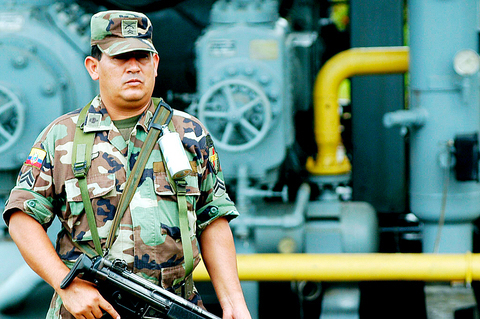Ecuador's government has deployed troops to its Amazon region and claimed an end to six days of civil unrest that had cut oil exports, but protesters declared only a truce in their fight for a larger slice of oil revenues.
About 60 protest leaders arrived in the capital Quito late Sunday in military planes to hold talks with the government in a bid to end a strike that has cost millions of dollars.
"We granted a suspension to talk with administration officials, but lifting the strike depends on the agreements we reach," Orellana provincial governor and protest leader Guadalupe Llori said earlier in a telephone interview.

PHOTO: EPA
However, Interior Minister Mauricio Gandara said late on Saturday that residents of the region "had decided to end the strike."
"Reason has prevailed and people will be returning to work because the damage from the strike has been enormous, reaching about US$500 million," the minister said.
The government of President Alfredo Palacio declared states of emergency in Sucumbios and Orellana provinces in Ecuador's Amazon basin on Wednesday when protesters demanded a greater share of oil revenues.
Defense Minister Oswaldo Jarrin, whose predecessor resigned on Friday, said the states of emergency would remain in force.
The protests forced Ecuador to suspend oil exports, a key source of foreign exchange, costing the country some US$30 million a day.
Ecuador is South America's fifth-largest oil producer and more than half of its exports go to the US. It also supplies Asian nations.
Private companies produce 340,000 barrels a day, but their output was cut to about 150,000 barrels because of the dispute, said Rene Ortiz, a spokesman for the private oil firms.
State oil firm Petroecuador resumed oil production on Sunday after it was shut down. But instead of the normal 201,000 barrels a day, its output was at 54,000 barrels, Energy Minister Ivan Rodriguez said.
Rodriguez said on Sunday that Ecuador may take up Venezuelan President Hugo Chavez' offer to make up any shortfall in oil needs.
"Possibly this week we will travel to Venezuela to work out a deal allowing us to import crude or [oil] derivatives or both," he said.
Troops lifted roadblocks and protected oil facilities from attack, Petroecuador said in a statement.
"With the cooperation of the armed forces we have managed to reopen some roads and gain access to the operational areas, thanks to which the oil workers can restart operations in those stations and wells which are not heavily affected" by the protests, it said.
The protesters, including government officials and lawmakers, want foreign oil companies to build 200km of roads in their regions and to give more jobs to locals.
They also want the government to renegotiate all contracts with foreign oil companies and demand 50 percent of oil profits.
The Roman Catholic Church and an association of provincial councils will mediate the government talks, protest leaders said.
Clashes between demonstrators and security forces have left at least 60 injured, said Sucumbios Governor Guillermo Munoz. He was arrested late on Friday, along with Maximo Abad, mayor of Lago Agrio, for allegedly leading the protests. The pair were later freed.

Auschwitz survivor Eva Schloss, the stepsister of teenage diarist Anne Frank and a tireless educator about the horrors of the Holocaust, has died. She was 96. The Anne Frank Trust UK, of which Schloss was honorary president, said she died on Saturday in London, where she lived. Britain’s King Charles III said he was “privileged and proud” to have known Schloss, who cofounded the charitable trust to help young people challenge prejudice. “The horrors that she endured as a young woman are impossible to comprehend and yet she devoted the rest of her life to overcoming hatred and prejudice, promoting kindness, courage, understanding

‘DISRESPECTFUL’: Katie Miller, the wife of Trump’s most influential adviser, drew ire by posting an image of Greenland in the colors of the US flag, captioning it ‘SOON’ US President Donald Trump on Sunday doubled down on his claim that Greenland should become part of the US, despite calls by the Danish prime minister to stop “threatening” the territory. Washington’s military intervention in Venezuela has reignited fears for Greenland, which Trump has repeatedly said he wants to annex, given its strategic location in the arctic. While aboard Air Force One en route to Washington, Trump reiterated the goal. “We need Greenland from the standpoint of national security, and Denmark is not going to be able to do it,” he said in response to a reporter’s question. “We’ll worry about Greenland in

PERILOUS JOURNEY: Over just a matter of days last month, about 1,600 Afghans who were at risk of perishing due to the cold weather were rescued in the mountains Habibullah set off from his home in western Afghanistan determined to find work in Iran, only for the 15-year-old to freeze to death while walking across the mountainous frontier. “He was forced to go, to bring food for the family,” his mother, Mah Jan, said at her mud home in Ghunjan village. “We have no food to eat, we have no clothes to wear. The house in which I live has no electricity, no water. I have no proper window, nothing to burn for heating,” she added, clutching a photograph of her son. Habibullah was one of at least 18 migrants who died

Russia early yesterday bombarded Ukraine, killing two people in the Kyiv region, authorities said on the eve of a diplomatic summit in France. A nationwide siren was issued just after midnight, while Ukraine’s military said air defenses were operating in several places. In the capital, a private medical facility caught fire as a result of the Russian strikes, killing one person and wounding three others, the State Emergency Service of Kyiv said. It released images of rescuers removing people on stretchers from a gutted building. Another pre-dawn attack on the neighboring city of Fastiv killed one man in his 70s, Kyiv Governor Mykola